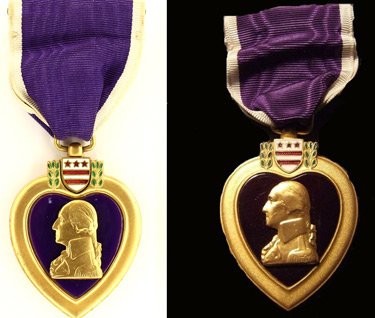US Government Still Handing Out Purple Heart Medals Made for the Invasion of Japan
Operation Olympic, Purple Heart, WWII

A WWII-era Purple Heart (left) next to one received in Afghanistan (right).
The… Battle of Okinawa with its high casualty rates and fierce defenders made it clear to American leadership that the upcoming invasion of Japan’s main island would be a costly one for both sides.
To make matters worse President Roosevelt died and his vice-president and successor, Harry Truman, was faced with a choice: an amphibious invasion that would kill an estimated 1 million Allied troops and upwards of 10 million Japanese or drop the new destructive superweapon – the atomic bomb – and force a Japanese surrender.
As Truman worked on his next move, the military’s top brass had no idea what his choice might be. In preparation for the invasion option, the U.S. military ordered hundreds of thousands of Purple Heart medals made, and stored them in a warehouse in Arlington, ready to be handed to those wounded in Operation Downfall.
The attack, of course, never came. Truman went for the nuclear option.
So what to do with all those medals? Give them to the troops, of course. World War II was over but there was still plenty of American combat to come in the 20th century. Though the U.S. has ordered 34,000 more of them after the Vietnam War, the medals from 1945 are still updated and issued as needed.
“Time and combat will continue to erode the WWII stock, but it’s anyone’s guess how long it will be before the last Purple Heart for the invasion of Japan is pinned on a young soldier’s chest,†historian D.M. Giangreco, said in a 2010 e-mail to Stars and Stripes.
The refurbished medals were distributed to military posts, units, and hospitals between 1985 and 1999. Even if new ones were made, the number given wounded service members through 2010 is still less than the number manufactured in 1945.
My father was in the Special Troops of the Third Marine Division, scheduled to be the spearhead of the Invasion of Southern Kyushu. Having blasting experience from the Pennsylvania coal mines, my father would have been tasked with blowing up Japanese pillboxes. Lucky for me this never happened.





